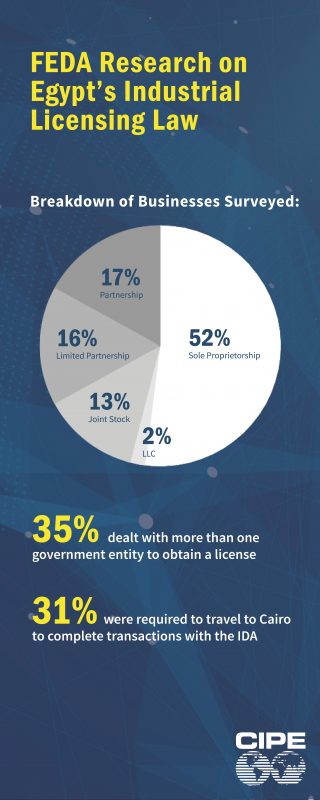
CIPE’s partner in Egypt, the Federation of Economic Development Associates (FEDA) recently released an illuminating report on the implementation gap present in a 2017 law that substantially simplifies the process of obtaining an industrial license (a requirement before starting construction or manufacturing activities). The report lays out the difference between the law as it is written and how it has been carried out in practice. Drawing on CIPE’s previous work on addressing implementation gaps, including the report, “Improving Public Governance Guide: Closing the Implementation Gap between Law and Practice”, FEDA conducted a comprehensive study of how the industrial licensing law has been implemented. FEDA determined that the executive regulations are inconsistent with the law. If the executive regulations are revised, enforcement of the law will be possible and will significantly boost capital investments and create jobs in the industrial sector, ultimately boosting Egypt’s overall economy.
This recent legislation, Law No. 15 of 2017, represents an important step toward the Egyptian government’s goal of strengthening the industrial sector, as well as the Egyptian government’s efforts to support the economic inclusion of small and medium-sized enterprises (SMEs). The law streamlines Egypt’s licensing process by reducing fees and red tape that have made it particularly challenging for small and medium-sized businesses to enter the industrial sector. On paper, the law decreases the number of licensing procedures, establishes accreditation offices so SMEs don’t have to travel to Cairo or engage with unnecessary bureaucracy, and reduces the wait time for licenses from two years to less than one month.

FEDA is a country-wide umbrella organization of more than 120 local business associations and civic organizations, whose total membership is 30,000 SMEs throughout Egypt. In order to assess the impact of Law 15 and its executive regulations, FEDA conducted research on the implementation of this law through the eyes of investors and small business owners. FEDA surveyed more than 100 businesses and investors and conducted a series of seven meetings and workshops held in different regions. The recommendations generated and the feedback process of conducting the research were tremendous opportunities for economic inclusion, and for small business owners to have a voice in policymaking. The diversity in size of the businesses surveyed and the broad geographic spread of the study allowed FEDA to gain a deeper understanding of how the law has affected the business community at large, not just economic elites. Crucially, these workshops also provided participating businesses with the opportunity to hold in-depth discussions with officials from the Industrial Development Authority (IDA) and members of parliament who attended these events. The IDA is the agency in charge of issuing industrial licenses, so these discussions allowed business owners to address their concerns directly to the key players. This is particularly significant because there are limited opportunities for the business community, particularly small business owners, to have a voice in policymaking in Egypt.
Although FEDA’s study concluded that there are serious problems in the implementation of the law, the law itself introduces much-needed reforms to the industrial licensing process. The industrial licensing process itself is critical because it is inadvisable to begin industrial activity without a license. There are stiff penalties for doing so, including fines or imprisonment. Additionally, industrial activities tend to require large capital investments and generate many employment opportunities, so there is a lot to lose if a project is shut down because it was not properly licensed. Despite this, the process for obtaining a license was so difficult prior to the new law that many businesses failed to obtain the proper certification, often to their detriment. Before the law was passed, in 2013, FEDA conducted a study on faltering/failing enterprises and found that 36% of the surveyed businesses had not obtained the required industrial registration certificate because the process to do so was so challenging and they had encountered so many problems.
In addition to being a barrier to economic growth, cumbersome regulations and high fees place an undue burden on SMEs and businesses that are located in underserved regions. The new law aimed to address these issues and promote the inclusion of previously underserved segments of the industrial business community by designating the IDA as the sole authority to issue industrial licenses. This reduced the numbers of agencies that investors or business owners would have to engage with from 11 to just one. The law also introduced a system of “accreditation offices,” which are privately run offices that have the authority to review licensing requirements. They were designed to have more widely accessible locations, thus limiting the need for business owners to travel to the capital to obtain licenses. Ultimately, these reforms were intended to cut the waiting time for license issuance from approximately two years to less than one month. However, there have been a lot of problems in the implementation of this law, including the fact that these offices are not yet operational, and few of the promised benefits have been realized to date.

Based on the findings of the study, CIPE and FEDA have developed recommendations to improve the implementation of the law. The first problem identified was lack of information about the law; most participants in the study were not aware that a new law was issued, and those who were aware of the law were not familiar with the changes that it had introduced. This is due to the Ministry of Industry and the IDA’s failure to adequately disseminate information about the new law or reach out to business associations. Additionally, many of the entities that used to issue licenses are taking advantage of the IDA’s weak capacity and still exercising this authority, thus subjecting businesses to unauthorized inspections and fees. Sixteen percent of respondents reported that they had to deal with more than one government entity to receive their industrial license when, according to the law, businesses should only have to deal with the IDA.
This introduces the second big problem identified by the study: the IDA’s weak capacity. The IDA does not have branches in every governate, and offices that do exist suffer from staff shortages and inadequately trained staff. Participants in the study overwhelmingly identified low capacity as a problem. Fifty-three percent of participants surveyed thought that IDA staff lack the capacity to carry out their duties. The report recommends that sufficient funding be allocated for the IDA to increase its capacity so that it can carry out its mandate, and that the IDA be more proactive in reaching out to the local business community.
The third problem that participants identified has to do with the IDA’s power to grant and allocate land for industrial use, as established by Law No. 95 of 2018. Participants reported that it was difficult to secure a parcel of land that is appropriate for the enterprise and has access to the necessary utilities in industrial areas, particularly for SMEs. Even when land is available, participants complained that the process for acquiring land is corrupt and is an opportunity for officials to exploit the investor. Many investors reported that the IDA is taking advantage of the situation to generate profits by raising the price of industrial land. FEDA’s report recommends that the IDA implement a fair and transparent process for acquiring industrial land and equipping it with utilities, which would also prevent monopolistic behavior from large investors. The report also suggests that the IDA address the scarcity of industrial land by offering plots of land from government-owned abandoned or underused industrial sites to small businesses. Additionally, the IDA should lower the price of land allocated to SMEs, especially for plots smaller than 500 square meters.
Upon releasing this report, FEDA shared their findings with the IDA. FEDA, with support from CIPE, is currently working on drafting revisions to the executive bylaws and regulations to submit to IDA and the Ministry of Trade and Industry to bridge the implementation gap and be consistent with the law. These proposals will focus on closing the implementation gap and allowing SMEs to reap the benefits of better industrial licensing procedures. If Law No. 15 is implemented as intended, and the process for allocating land under Law 95 is improved, it will not only support SMEs, but generate jobs and fuel economic growth in the industrial sector, which will benefit Egyptian citizens.
To read the blog in Arabic, please visit: https://cipe-arabia.org/التراخيص-الصناعية-خطوة-للأمام-ولكن/
Isabelle Mahnke is a program assistant for the Middle East and North Africa at CIPE.
Published Date: February 12, 2019